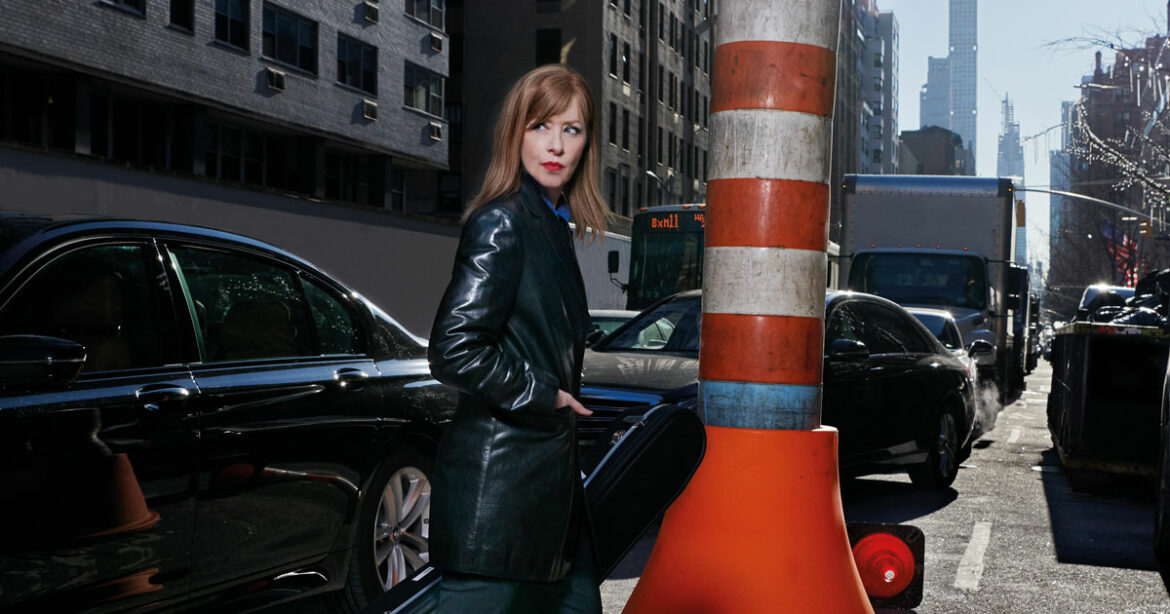Before she takes to the stage at the Cambridge Folk Festival, Suzanne Vega speaks to us about her latest album
Words: Miriam Balanescu / Image: George Holz
Long orbiting the New York folk revival scene, it had been decades since Suzanne Vega – on tour, essentially, for the past 35 years – had touched back down to earth in her home city. After releasing an album dedicated to the Big Apple in 2019, An Evening of New York Songs and Stories, the pandemic loomed – and she was coincidentally stuck at home.
Suzanne is now touring her ode to the city around the world, an album born out of a string of performances at the iconic Café Carlyle, which has seen performances from Eartha Kitt and Judy Collins. “By the second week, we decided to record it because the elevator boys said they heard people talking about how great a show it was.”
This was an opportunity to do the jazzier, sexier songs
Interspersed with monologues and explainers, An Evening… is conversational and theatrical, drawing on Suzanne’s dramaturgical history. “I base the look of the album on the idea of New York as a woman,” Suzanne says. “The femme fatale character in that song. This was a wonderful opportunity to do the jazzier, sexier songs that I don’t always get to do.
I tried to make it like a cabaret show.”
Suzanne’s love of stories originated in having to tell them. “I’m the oldest of four children, often given the task of keeping them entertained and out of trouble,” she says. “They’re the worst audience to read to, because if they don’t like what you’re saying, they’ll walk away. I had to learn how to keep their interest.”
Suzanne is famous for her accidental earworm, Tom’s Diner – a folksy single that, when remixed in 1990, wound its way into clubs and onto radios across the globe. “It’s gone from being solitary figures sitting at a diner to this sort of crazy party situation,” the songwriter reflects.
Her other hit, Luka, even contributed to changing laws on stalking in Albany: “I grew up with radical parents in the 60s – we went to all the demonstrations and marches. That made me rather cynical. I remember feeling if a song could change the world, then surely we would not have any more conflict after Bob Dylan wrote Masters of War.
“I wrote Luka for personal reasons,” Suzanne continues. “My manager heard it and said, ‘This is a song about an issue.’ We actually had a sort of shouting match. He felt that music and culture had stopped the Vietnam War in the 70s.”
Suzanne’s folk roots lie in her stepfather strumming guitar, and unearthing Folk Song and Minstrelsy in a thrift shop. “Everybody else was listening to Lou Reed and David Bowie – having a glam moment – and I embraced this album of songs that I could teach myself how to play.”
Her 1992 album, 99.9F°, thrust the folk genre forward into electronic territory. “I didn’t want to be an interpreter of folk music,” she explains. “I was looking to write songs in a way that was modern. I grew up in New York with a Puerto Rican stepfather, around the time of punk rock and new wave. I wanted to mash these ideas together. My family embraced technology. My mother was a computer systems analyst. In the 70s, she would bring these computers home, which were the size of small refrigerators.”
Suzanne’s trailblazing has landed her in the Billboard Alternative Top 10 list three consecutive times, although she is one of few recognised women – despite long being inspired by female musicians. In 1987, upon meeting her birth father, she discovered a matrilineal musical lineage – her grandmother had been a drummer in an all-female band in the 30s, playing on the vaudeville jazz circuit. “I remember in the beginning of my own career, people seemed to think this was so unusual that I could play guitar and write my own lyrics,” Suzanne says. “I had seen so many women do that already.”
Catch Suzanne live at Cambridge Folk Festival on 29 July.

